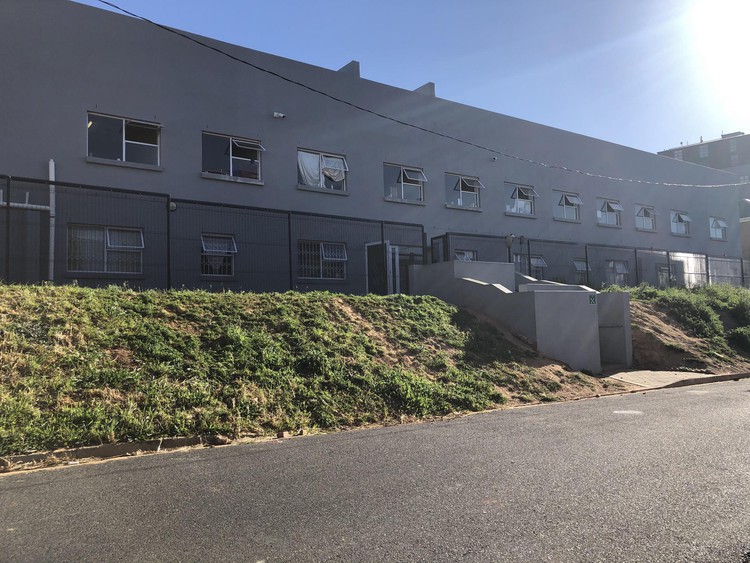
Nineteen Woodstock families have been moved to the Pickwick transitional housing site in Salt River, near the city centre. Photo: Drew Wayland
6 September 2019
Four months ago, 19 families left behind the shacks and wendy houses at the end of Pine Road in Woodstock to start new lives at Cape Town’s first transitional housing facility.
The new residents of the Pickwick site, just two kilometres from the Pine Road settlement, spoke of relief and joy at having proper shelter, water and electricity at the facility.
The blue painted concrete building has 30 rooms for residents, each ten square metres. It costs R300 per month to rent a room, although many people have their rent subsidised by the City of Cape Town. There are communal bathrooms and a kitchen, as well as common areas for people to relax.
Pickwick was developed and built by the City, but many operations within the facility are run by the Development Action Group (DAG).
Conrad Meyer, a project leader for DAG, described residents’ joy upon moving in, but wondered how the community would adjust from informal to formal living conditions.
“It’s been a remarkable change,” he said when GroundUp checked in on the Pickwick site on Wednesday, “and it’s happened so much faster than we ever expected. Where [the residents] came from at Pine Road, there were lots of gangs and accidents. No one was looking out for them. We thought the first few weeks might be crazy here. But people have already begun to change their lives.”
Lorenzo Johnson is new to DAG and works with Pickwick residents as a project support officer. He said that a quick adjustment to formal living is the best he could have hoped for the families. “I hope that the City will take notice of our successes here,” he said.
Pickwick is the first and only housing facility of its kind in the Western Cape, and DAG hopes that its success will push the City to develop new transitional housing for Cape Town’s many evicted people. The City has been criticised by housing activists for relocating people far from the city centre to places like Blikkiesdorp and Wolwerivier. Pickwick, by contrast, is a couple of kilometres from the city centre.
The facility has even created jobs for a few of its residents, hiring four current tenants as maintenance and cleaning staff.
Privacy and security are among the biggest advantages of moving to the facility for the residents. Shortly after the families moved in, community members met to create their own rules about maintenance, cleanliness, and access control with the building managers.
“Giving people a sense of agency, of control over their own lives is very important,” said Meyer. “We didn’t want to impose rules on anyone.”
At the Pine Road settlement, residents lived primarily in single-room wendy houses with multiple family members. At Pickwick, most people live in private single rooms. One resident, who preferred to be called Anna, says having her own space gives her peace of mind.
“I have learned to stock up on food and necessities since I came here,” she said, displaying a cupboard beneath her television set filled with food items.
Meyer said that residents feel safer here, as one can only access the building by fingerprint scans, which were taken during the initial move-in in May.
“They don’t have to worry about fires anymore either,” he said. GroundUp spoke to one resident who said fires had been common at Pine Road because people would cook over an open flame inside their houses.
Meyer said people were now using kettles and hot plates “and there’s enough electricity for everyone,” said Meyer.
He added that he had noticed a significant change in residents’ wellness and behaviour. While many younger residents struggled with daily alcohol or drug abuse, Meyer said that at Pickwick, people are motivated to stop.
“To see the psychological change in people is amazing,” he said. “Having proper shelter — a roof over your head — can change a person completely. The same people I used to see who were drunk or high every day, now I see them some days and they’re not […] some of them even ask me how they can stop, how they can get better.”
While the City has stalled on many of the housing projects in Woodstock and Salt River, construction is moving forward at the old Pine Road site, where a large social housing unit will be completed in 2021.
Pickwick residents who earn between R1,000 and R15,000 per month will have first priority to move into the housing, built on the land they occupied for more than 20 years. Residents who make less, or live primarily on social grants, will stay at Pickwick indefinitely, but Meyer said he doesn’t think they will mind too much.
“This is a good place for people […] things like water and electricity are paid for, and at social housing they’re not. I think some people will choose to stay.”